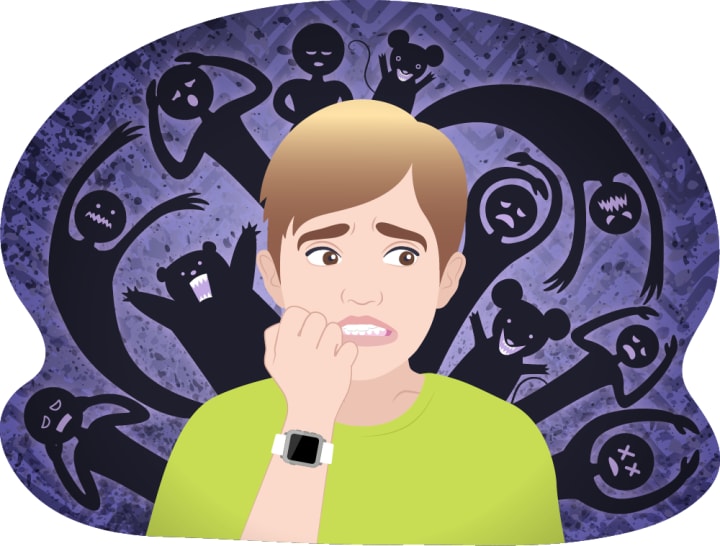The Silent Struggle
Shedding Light on Anxiety Disorder and its Impact on Daily Life

Millions of people all over the globe are afflicted by the common mental health condition known as anxiety disorder. Excessive worry, fear, and nervousness that can interfere with everyday living can be its hallmarks.
Anxiety illnesses can take a variety of forms, including:
1. Generalized anxiety disorder (GAD): This condition is characterized by constant, excessive worry and dread about ordinary occurrences.
2. Panic disorder: This condition is characterized by brief, intense episodes of dread and panic that are frequently accompanied by physiological signs like sweating and a rapid heartbeat.
3. Social anxiety condition, also referred to as social phobia, is characterized by apprehension and avoidance of social situations out of concern for embarrassment or judgment.
4. Obsessive-compulsive disorder (OCD): This condition is characterized by recurrent, disturbing thoughts (obsessions), which cause repetitive actions or ideas (compulsions), all in an effort to reduce anxiety.
5. Post-traumatic stress disorder (PTSD): This condition develops after having or seeing a traumatic incident and includes symptoms like flashbacks, nightmares, and avoidance behavior.

Anxiety disorders can be brought on by a variety of biological, environmental, and psychological factors, so there is no singular cause for them. The following are a few of the most typical causes of anxiety disorders:
1.Genetics: Research has shown that anxiety disorders can run in families, indicating that the disease may have a genetic component.
2. Brain chemistry: Imbalances in certain brain chemicals, such as serotonin, dopamine, and nor-epinephrine, may be responsible for anxiety conditions.
3. Trauma: An anxiety disorder can be brought on by experiencing or witnessing a traumatic event, such as abuse, violence, or a natural catastrophe.
4. Environmental elements: demanding living circumstances, such as moving, Losing your job or getting divorced can raise your chance of anxiety disorders.
5. Personality traits: Anxiety disorders may be more likely to develop if a person has certain personality traits, such as a propensity towards perfectionism or a low tolerance for uncertainty.
6. Medical conditions: Heart illness, thyroid issues, and chronic pain are a few conditions that can exacerbate the signs of anxiety.
7. Substance abuse: Using drugs and alcohol can exacerbate or exacerbate the signs of anxiety.
It's crucial to keep in mind that every person's experience with an anxiety condition is different and could have various contributing factors.
People of all ages, from infants to the elderly, can suffer from anxiety illnesses. However, studies have shown that some age groups are more likely than others to experience anxiety conditions.

Approximately 22.3% of adults in the 18 to 25 age range report having an anxiety disorder at some point during the year, according to the National Institute of Mental Health (NIMH). Approximately 19.9% of adults aged 26 to 49, 14.8% of adults aged 50 to 64, and 8.3% of adults aged 65 and older reported having an anxiety disorder in any particular year. The prevalence of anxiety disorders declines with age.
Even though they are less frequent in adolescents, anxiety disorders can still happen. According to the NIMH, 31.9% of teenagers between the ages of 13 and 18 will at some stage in their lives suffer from an anxiety disorder.
The particular type of anxiety disorder, as well as other variables like gender, race, and socioeconomic position, should be taken into account when interpreting these statistics, which are only estimates. Regardless of age, it's critical to seek professional assistance if you or someone you know is exhibiting symptoms of an anxiety disorder.
In conclusion, managing an anxiety illness can be difficult, but there are a lot of easy preventative measures you can take. You can lessen the effects of anxiety on your life and experience greater well-being by using relaxation techniques, engaging in regular exercise, getting enough sleep, keeping a healthy lifestyle, and seeking professional assistance.

Here are some easy recommendations for preventing anxiety disorders at home:
1. Engage in deep breathing exercises: Deep breathing is an easy method to reduce anxiety and calm your mind. Inhale deeply through your nostrils, hold your breath for a moment, and then slowly let it out through your mouth.
2. Regular exercise: Exercise is a fantastic method to lower stress and anxiety. Daily physical exercise of even a few minutes can have a significant impact. Try going for a jog or a walk outside, or use an online exercise video.
3.Take breaks from technology: Being on your phone or computer for extended periods of time can exacerbate anxiousness. Take periodic breaks throughout the day to unplug and carry out offline activities, such as reading a novel or going for a walk
.4. Get enough sleep: Sleep is crucial for one's physical and mental well-being. Aim for 7-8 hours of sleep per night and try to create a consistent sleep schedule.
5. Consume a well-balanced diet: Eating stress- and anxiety-reducing diet can help. Try to include a variety of fresh produce, whole cereals, lean proteins, and whole grains in your meals.
6 Engage in mindfulness exercises: Mindfulness is the practice of remaining concentrated and present at the moment. It can ease tension and enhance general well-being. Aim to concentrate on your breath and your surroundings for a few minutes each day while engaging in mindfulness meditation
7. Maintain relationships with loved ones: Social support is crucial for mental wellness. Make time to communicate with loved ones, whether it be over the phone, via video chat, or during a socially isolating outdoor exercise.
Keep in mind that everyone has problems in life, but we must conquer them because problems are a part of life. Don't worry about the issue; discover a solution, and live your life to the fullest.
I appreciate you taking the time to read this, and I trust it will benefit you.
About the Creator
Ravindra Chauhan
Hello, my name is Ravindra Chauhan. "Join me on a journey to optimal health and wellness! As a passionate health, enthusia. Let's embrace a vibrant lifestyle together and unlock the secrets to becoming the healthiest version of ourselves."






Comments
There are no comments for this story
Be the first to respond and start the conversation.